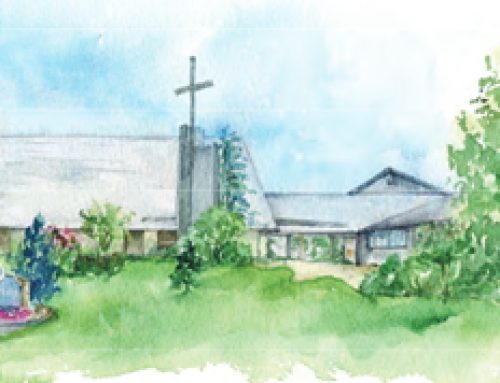This is my body given for you; do this in remembrance of me.
FROM THE PASTOR’S DESK
Dear Parishioners,
Greta Garbo was a famous Hollywood actress who was notorious for making whatever excuse she could to avoid public gatherings. On one occasion, a friend asked her why she turned down an invitation to the most important Hollywood banquet of the year. She replied, “How do I know that I will be hungry that night?”
Garbo’s comment serves her own purpose. But, of course, it makes no sense. We know that we will be hungry every night. The thing about food is that not only do we need it to live, we need it every day. This truth helps us to understand today’s gospel, because Jesus presents himself as food, as living bread. Throughout the gospel of John, Jesus applies images to himself in order to convey his purpose in our lives. In one place, he says, “I am the light of the world.” As light, Jesus is telling us that we need him to see what is good and true. In another place, Jesus says, “I am the good shepherd.” A shepherd takes care of the sheep. As shepherd, Jesus showing us that we need him to be safe. In today’s gospel, Jesus says, “I am the bread that has come down from heaven.” As bread, Jesus reveals to us that we need him for life and that we need him every day. As bread, Jesus is saying it is not enough to turn to him when we need to be protected or when we need guidance. We need to turn to him every day, because he is our food.
So how can we be fed by Jesus each day? Well, there are some great and obvious ways. The most glorious is the one that we celebrate today on the feast of The Body and Blood of the Lord: the Eucharist. We, as Catholics, believe that when the bread and wine are blessed on the altar, they become for us the real presence of Jesus: his body, his blood, his soul, and his divinity. When we receive the body and blood of Christ, Jesus feeds us and shares his power and grace with us. But we are fed not only by the Eucharist, but also by the word of God in the scriptures. Each time we read from the Bible and seek its meaning, Christ nourishes us.
Clearly the Eucharist and the Bible are crucial ways to be fed. But few of us receive the Eucharist or read the Bible every day. How then can we be fed by Christ daily? We can adopt a habit of prayer. Now when I speak of prayer, I am not talking about saying prayers, although saying prayers is valuable. If you are able to say the rosary or to set aside fifteen minutes for meditation each day, please do so. But the prayer I am advising is much simpler. I am talking about connecting regular events in our lives to Christ. For example, when you open your eyes in the morning, why not commit yourself to make that moment a prayer. It can be a simple “Thank you, Lord, for this day,” and perhaps, “Help me with my interview or test today.” In that moment of prayer, Christ will feed you. When you say goodnight to your children or to your spouse, why not make that moment a prayer. You can choose to bless God for the people who make your life worth living. In that blessing, Christ will nourish you. When you see a funeral procession, train yourself to stop and say a prayer for the person who has died and ask Christ to increase your belief in eternal life. By pausing to do that, Christ will strengthen your faith. When you see something that is wrong in the world, in your family, at work, or at school, stop and ask Christ to heal that situation and show you how you might make it better. In that prayer and the service that flows from it, Christ will be your bread.
We need to be fed by Christ every day. Our food is the Eucharist, the scriptures, and simple prayer at the key moments of life. How often do we need to be fed? More than once. If Christ is our food, three times a day is reasonable. So, find a way to be fed by Christ daily. Make him your breakfast, lunch, and dinner—and perhaps, a snack before you go to sleep.
Peace,
Fr. Monteleone
To read the complete bulletin click here



